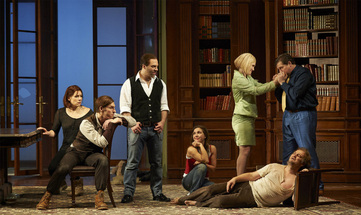 A scene from the COC's Don Giovanni. Photo: Michael Cooper.
A scene from the COC's Don Giovanni. Photo: Michael Cooper. The Canadian Opera Company’s current production of Don Giovanni is a train-wreck. And like any good train-wreck, it’s disastrous in a spectacular way.
The curtain rose on a magnificent wood-paneled room – the library of a mansion. It was a beautiful tableau, but it grew tiresome as it became apparent that this set (designed by Tcherniakov) would be used for every scene in the opera – whether it made any sense or not. Campy modern-dress costumes established the production as an “update,” to our own era.
What followed was so elaborately wrongheaded that it’s hard to know where to begin discussing it. Act I is a flurry of activity, as Tcherniakov finds things to keep his singers busy. However, much of what he has them doing is arbitrary and distractingly pointless. Why does Donna Anna rip open Don Ottavio’s shirt? And the director’s penchant for dropping the curtain on every scene renders the whole act choppy and disjointed.
Act II, by way of extreme contrast, is static and burdened with longueurs. For much of the time, the cast is simply lying on the floor, for no apparent reason.
And it didn’t help that conductor Michael Hoffstetter chose to re-enforce the uneven pacing of the show, in his leadership of the COC Orchestra. (The Chorus was kept offstage in this production – probably because Tcherniakov couldn’t find a way to shoehorn them into his vision.)
Our director also turned his attention to re-inventing the character of Don Giovanni. In this production he's not a swaggering rogue, as he’s often portrayed. Here he is mentally unbalanced, and by end of the opera he has gone completely insane. This isn’t a bad idea, perhaps – but it’s played out in strange ways. For most of Act I Braun’s wonderful baritone voice is reduced to a weak sotto voce. But in Act II, he throws himself into a raging verismo delivery, before expiring from a heart-attack.
Happily, there were also some other fine voices in this production. Tenor Michael Schade was in fine form as Don Ottavio – although he indulged in some unnecessarily extreme dynamic contrasts. And bass-baritone Kyle Ketelsen was a robust, rough-hewn Leporello.
Among the women, the best voice belonged to soprano Jane Archibald, whose Donna Anna was consistently clear, strong and supple in her delivery. Soprano Jennifer Holloway, as Donna Elvira, also had a strong voice, but her intonation not always entirely secure. And soprano Sasha Djihanian had a pretty, girlish voice, well suited to Zerlina.
The problem with Tcherniakov’s Don Giovanni is not that it isn’t what the composer intended. The problem is that it’s “Howard Hughes-crazy” – driven by bold, imaginative ideas, but hopelessly eccentric and deeply confused. It was a daring experiment that failed.
© Colin Eatock 2015
 RSS Feed
RSS Feed

